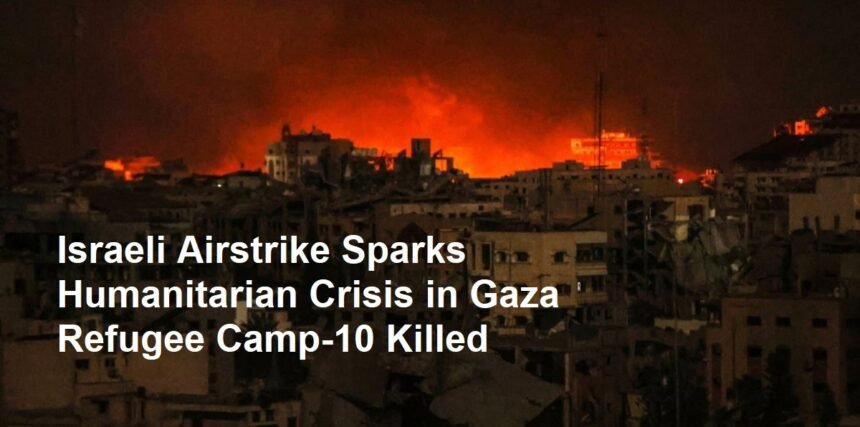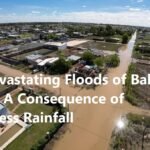Khan Younis, Gaza – April 16, 2025
A deadly Israeli airstrike struck a densely populated refugee camp in Khan Younis, southern Gaza, on Wednesday, killing at least 10 Palestinians and igniting a massive fire that engulfed makeshift shelters. The attack, which occurred shortly after midnight, has drawn widespread condemnation from international organizations and heightened fears of further escalation in the besieged enclave.
Details of the Attack
According to Gaza’s Health Ministry, the strike targeted a cluster of tents housing displaced families in the Al-Mawasi area, a designated “humanitarian zone” near Khan Younis. The explosion triggered an intense blaze, fueled by cooking gas canisters and flammable materials in the camp, which firefighters struggled to contain for hours. Among the dead were three children and four women, while over 20 others sustained severe burns and injuries.
Eyewitnesses described scenes of chaos as panicked residents fled through smoke and debris. “The fire spread faster than people could run. We pulled bodies from the tents, but some were burned beyond recognition,” said Ahmed Al-Najar, a local volunteer with the Palestinian Red Crescent. Footage shared on social media showed charred tents and smoldering debris, with the wails of survivors echoing in the background.
The Israeli military confirmed the operation, stating it targeted a “Hamas weapons storage facility” hidden within the camp. In a press release, the Israel Defense Forces (IDF) claimed the site was used to stockpile rockets and accused Hamas of “using civilians as human shields.” However, no immediate evidence of militant activity in the area was provided.
International Outcry
The strike has drawn sharp rebukes from global leaders and humanitarian agencies. United Nations Secretary-General António Guterres condemned the attack as “a blatant violation of international humanitarian law,” urging an independent investigation. “Civilian areas must never be battlegrounds,” he stated during an emergency UN Security Council briefing.
The European Union and Arab League echoed calls for accountability, while Türkiye and Egypt labeled the strike a “war crime.” The U.S. response was more measured, with State Department spokesperson Vedant Patel reiterating support for Israel’s “right to self-defense” but emphasizing the need to “minimize civilian harm.”
Deepening Humanitarian Toll
The attack exacerbates Gaza’s already catastrophic humanitarian situation. Since the outbreak of renewed hostilities in October 2023, over 1.8 million Palestinians—nearly 80% of Gaza’s population—have been displaced, with many forced into overcrowded camps lacking clean water, medical supplies, and adequate shelter. The World Health Organization (WHO) warned that Gaza’s healthcare system, already crippled by months of blockade and bombardment, is “on the verge of total collapse.”
Doctors at Nasser Hospital in Khan Younis reported being overwhelmed by burn victims. “We’re out of anesthesia and antibiotics. Many patients may not survive their injuries,” said Dr. Marwan Al-Hams, the facility’s director. Meanwhile, the UN Relief and Works Agency (UNRWA) condemned the strike as “another horrific blow to civilians clinging to survival.”
Khan Younis: A Recurring Flashpoint
Khan Younis, a city historically seen as a relative safe haven during past conflicts, has become a focal point of Israel’s recent military operations. The IDF launched a ground offensive in the area in early 2024, alleging Hamas had regrouped there following the collapse of a fragile ceasefire. Since then, repeated airstrikes and artillery shelling have reduced entire neighborhoods to rubble, displacing tens of thousands.
Wednesday’s strike has reignited protests across the occupied West Bank and Arab capitals, with demonstrators demanding an immediate ceasefire. In Ramallah, Palestinian Authority President Mahmoud Abbas accused Israel of “systematically destroying the foundations of peace.”
Regional and Global Implications
The attack comes amid stalled negotiations for a hostage-prisoner exchange deal between Israel and Hamas. Mediators from Qatar and Egypt have struggled to bridge gaps, with Hamas insisting on a permanent ceasefire and Israel refusing to halt military operations.
Meanwhile, the International Criminal Court (ICC) faces mounting pressure to expedite its years-long investigation into alleged war crimes in Palestinian territories. Wednesday’s strike is likely to intensify calls for accountability, though Israel rejects the court’s jurisdiction.
A Path Forward?
As global powers debate next steps, civilians in Gaza brace for further violence. With no end in sight to the war—now in its 19th month—aid groups warn that starvation and disease could soon claim more lives than airstrikes. “The world’s silence is complicit in this slaughter,” said Khaled Elgindy, a Middle East analyst at the Middle East Institute. “Without urgent intervention, Gaza’s nightmare will only deepen.”











